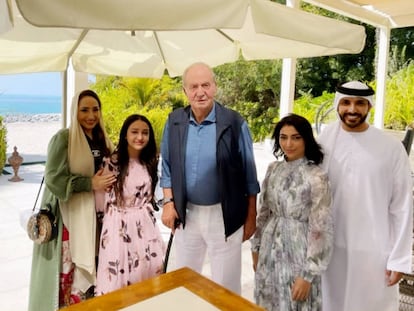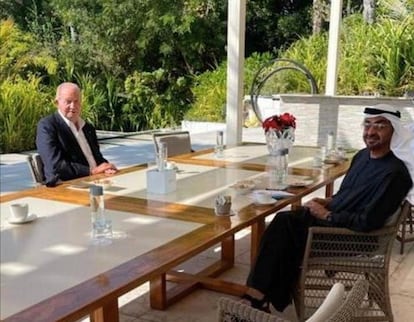The life of Spain’s emeritus king Juan Carlos I in Abu Dhabi
One year after leaving Spain amid accusations of financial irregularities, the former monarch is hoping to return to the country, but this is unlikely to happen any time soon

It’s been a year since Spain’s emeritus king Juan Carlos I left the country amid a scandal into his alleged financial irregularities. Now the former monarch lives in the United Arab Emirates, where he spends his days reading the Spanish press. What he reads – particularly about himself – almost always puts him in a bad mood, as he considers the facts to be incorrect, or at least, not how he remembers them, according to sources close to him.
These sources assure that Juan Carlos is living a life of luxury. Although the monotony of life and nostalgia for Spain can affect his mood, the former king no longer feels the same urgent need to return that he did some months ago, when he seemed willing to take the next plane to Madrid, even though this would have caused serious problems for his son King Felipe VI, Spain’s reigning monarch.
Since Juan Carlos left Spain on August 3 of last year, he has been living on Zaya Nurai Island, located 15 minutes by boat from Abu Dhabi, the capital of the United Arab Emirates. It is an exclusive site for the world’s most powerful, featuring a five-star hotel and 11 large mansions. On Zaya Nurai, restaurants and other venues do not have fixed opening hours, instead, they open when their elite clientele desires it. The mansion that is home to Juan Carlos – which was discovered by Spain’s free-to-air television station Telecinco – is 1,050 square meters, while the plot it is on extends 4,100 square meters. The mansion has six bedrooms, seven bathrooms, a swimming pool and access to a private beach. In February, Juan Carlos was photographed on the back porch of the house with Mohammed bin Zayed (colloquially known as MBZ), the crown prince of the Emirate of Abu Dhabi. On another occasion, he was seen with racing driver Amna al Qubaisi and her family.

Every morning, the emeritus king spends two hours in the gym and doing physical therapy, and in the afternoon, he receives visits from local leaders or foreigners living in the country, such as the Spanish diplomat Bernardino León.
The former monarch’s daughters, Elena and Cristina, visit their father nearly every month. Sometimes the sisters come together, other times they take it in turns to visit Juan Carlos. On one of those trips, Elena and Cristina were vaccinated against Covid-19. This happened at a time when Spain was only immunizing the most at-risk groups, meaning the sisters skipped the line in terms of the order of vaccination established by the Spanish authorities – a decision that sparked yet another conflict within the royal family.
Félix Sanz Roldán, the former head of Spain’s CNI intelligence service, has also visited Juan Carlos. But the emeritus king has not had many other visitors due to the coronavirus restrictions on travel and the fact that there are few direct flights.
Those who are close to Juan Carlos say loneliness has been his biggest enemy in these months. He has never been too keen on reading and instead spends his time watching films in the private cinema in his home and speaking on the phone with his many contacts.
The paradisiacal island has become a gilded cage. The emeritus king rarely leaves Zaya Nurai Island except to have dinner in Abu Dhabi. He has also made short trips to neighboring kingdoms, whose sheiks and princes treat Juan Carlos like a brother. But the former monarch is yet to leave the Arabian peninsula. His mobility is very limited, but he refuses to use a wheelchair like his sister Pilar, out of concern for his image. To walk he needs a cane as well as the support of two companions. A photograph shared in January showed Juan Carlos holding on to two men as he walked to the marina in Abu Dhabi.
The mansion Juan Carlos is living in has six bedrooms, seven bathrooms, a swimming pool and access to a private beach
They were two of the four Civil Guard officers who protect the emeritus king. The Spanish Interior Ministry pays the allowances of these guards as well as their travel expenses. Juan Carlos also has three aides – the same ones he had in Spain – who take it in turns to travel to the United Arab Emirates. In this way, the former monarch always has an aide by his side. These individuals are staff members of the Royal Household, but all their expenses are covered by the National Heritage office. That’s why, although Juan Carlos is a guest of the emir, his stay in the country is costing the Spanish state tens of thousands of euros every month. And no one knows how long he will remain there.
The emeritus king would return to Spain tomorrow if he could, according to sources close to him. Indeed, he wants to go back to La Zarzuela, the seat of the royal household, where he lived for 57 years. This demand complicates the situation, according to government sources. But on the other hand, it could make it easier. This way it would be impossible to ignore the real issue – Juan Carlos cannot return to La Zarzuela or Spain while he continues to be investigated by the public prosecutor and Tax Agency.
Instead of coming to an end – as was expected – both probes appear to have become increasingly complex, going down new and unexpected directions. Sources close to Juan Carlos believe the public prosecution service and Tax Agency are keeping an eye on each other – neither wants to be the first to close the investigation out of fear that something from the other case will hinder their probe. The former monarch’s only consolation is that, given that he has spent more than half the year outside of Spain, he is not considered a tax resident of the country, meaning the Tax Agency cannot probe his income information for 2021.
Juan Carlos I is in good health despite his ailments. In the United Arab Emirates, he has only been to the hospital for routine health checks and remained in observation after being vaccinated. But two years ago, in August 2019, he had open-heart surgery and it was suggested that he may need a pacemaker in the future. At 83 years of age, the risk of unexpected illness cannot be ruled out. And neither the Royal Household nor the Spanish government appears to have a plan on what to do with the emeritus king, other than buy time – time that is running out.
English version by Melissa Kitson.
Tu suscripción se está usando en otro dispositivo
¿Quieres añadir otro usuario a tu suscripción?
Si continúas leyendo en este dispositivo, no se podrá leer en el otro.
FlechaTu suscripción se está usando en otro dispositivo y solo puedes acceder a EL PAÍS desde un dispositivo a la vez.
Si quieres compartir tu cuenta, cambia tu suscripción a la modalidad Premium, así podrás añadir otro usuario. Cada uno accederá con su propia cuenta de email, lo que os permitirá personalizar vuestra experiencia en EL PAÍS.
¿Tienes una suscripción de empresa? Accede aquí para contratar más cuentas.
En el caso de no saber quién está usando tu cuenta, te recomendamos cambiar tu contraseña aquí.
Si decides continuar compartiendo tu cuenta, este mensaje se mostrará en tu dispositivo y en el de la otra persona que está usando tu cuenta de forma indefinida, afectando a tu experiencia de lectura. Puedes consultar aquí los términos y condiciones de la suscripción digital.








































